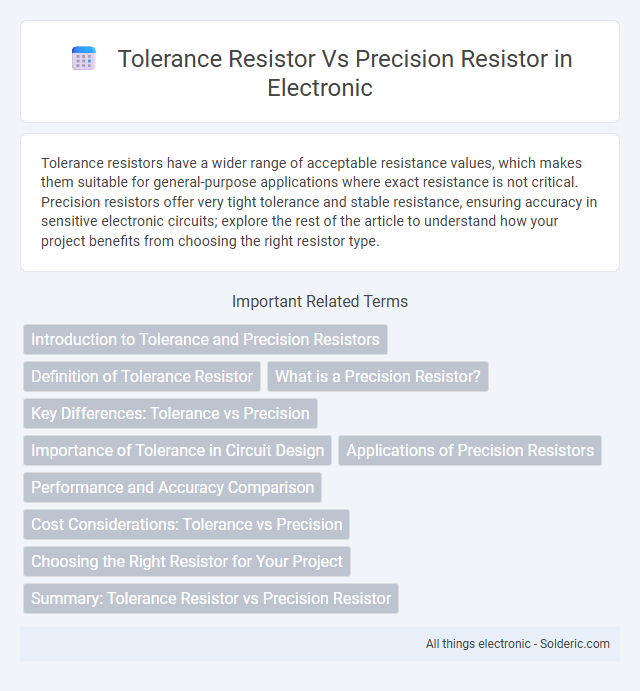Tolerance resistors have a wider range of acceptable resistance values, which makes them suitable for general-purpose applications where exact resistance is not critical. Precision resistors offer very tight tolerance and stable resistance, ensuring accuracy in sensitive electronic circuits; explore the rest of the article to understand how your project benefits from choosing the right resistor type.
Comparison Table
| Feature | Tolerance Resistor | Precision Resistor |
|---|---|---|
| Tolerance Range | +-5% to +-20% | +-0.1% to +-1% |
| Accuracy | Lower accuracy for general use | High accuracy for critical applications |
| Stability | Moderate stability | Excellent long-term stability |
| Temperature Coefficient | Higher ppm/degC (parts per million per degree Celsius) | Low ppm/degC for minimal resistance variation |
| Cost | Lower cost | Higher cost due to manufacturing precision |
| Applications | General electronic circuits, consumer electronics | Calibration, medical devices, instrumentation, aerospace |
| Manufacturing Process | Standard manufacturing | Controlled processes with strict quality control |
Introduction to Tolerance and Precision Resistors
Tolerance resistors are designed with a specified range of resistance variance, typically expressed as a percentage, indicating how much the actual resistance can deviate from its nominal value. Precision resistors offer extremely low tolerance levels, often as tight as 0.1% or better, ensuring highly accurate and stable resistance crucial for sensitive electronic applications. Your choice between tolerance and precision resistors depends on the required accuracy and consistency in your circuit design.
Definition of Tolerance Resistor
Tolerance resistor refers to a resistor characterized by the allowed percentage deviation from its nominal resistance value, typically ranging from +-1% to +-20%. This tolerance indicates the maximum variation in resistance the component can have during manufacturing, influencing circuit accuracy and performance. Unlike precision resistors that maintain extremely low tolerance levels (+-0.1% or less), tolerance resistors are used where high precision is not critical, offering cost-effective solutions for general applications.
What is a Precision Resistor?
A precision resistor is a high-accuracy component designed with a very low tolerance, typically ranging from +-0.01% to +-1%, ensuring minimal deviation from its nominal resistance value. Unlike standard tolerance resistors, which may have variations up to +-5% or more, precision resistors enable exact current and voltage control in sensitive electronic circuits, improving overall performance and reliability. Choosing the right precision resistor for your design guarantees stable resistance over temperature changes and time, critical in measurement and calibration applications.
Key Differences: Tolerance vs Precision
Tolerance resistors typically have a wider tolerance range, often between +-1% and +-20%, making them suitable for general applications where exact resistance values are less critical. Precision resistors offer much tighter tolerance levels, usually +-0.1% or better, ensuring highly accurate and stable resistance in sensitive electronic circuits. Your choice depends on whether your project requires standard performance or exact resistance control for optimized functionality.
Importance of Tolerance in Circuit Design
Tolerance in resistors directly affects the accuracy and stability of your electronic circuits, as it defines the permissible deviation from the nominal resistance value. Precision resistors, with tight tolerance levels often as low as 0.01%, ensure minimal variation, which is critical for high-accuracy applications like instrumentation and calibration. In contrast, tolerance resistors with wider tolerance ranges (e.g., 5% or 10%) are suitable for less critical functions where exact resistance value is less crucial.
Applications of Precision Resistors
Precision resistors are widely used in applications requiring high accuracy and stability, such as calibration equipment, measurement instruments, and medical devices. Their low tolerance values, often as tight as +-0.01%, ensure minimal deviation in circuit performance, making them ideal for sensitive analog circuits and high-frequency applications. Precision resistors are also critical in feedback loops of operational amplifiers and voltage regulation systems where exact resistance values influence overall device reliability and precision.
Performance and Accuracy Comparison
Tolerance resistors typically have a wider resistance variance, ranging from +-1% to +-20%, which may affect circuit performance where precise voltage or current control is critical. Precision resistors offer much tighter tolerances, often +-0.1% or better, ensuring greater accuracy and stability in sensitive applications such as instrumentation and calibration. Your choice between these resistors directly impacts the reliability and precision of electronic circuits, with precision resistors providing superior performance for demanding environments.
Cost Considerations: Tolerance vs Precision
Tolerance resistors generally have wider tolerance ranges, making them more cost-effective for applications where exact resistance values are not critical. Precision resistors feature tighter tolerance levels, resulting in higher manufacturing costs due to stricter quality control and enhanced material specifications. Choosing between the two depends on your budget constraints and the accuracy requirements of your electronic design.
Choosing the Right Resistor for Your Project
Choosing the right resistor for your project depends on the required tolerance and accuracy; tolerance resistors typically have a wider tolerance range (+-5% to +-20%) suitable for general applications, while precision resistors offer tight tolerance (+-0.1% to +-1%) essential for high-accuracy circuits. Precision resistors provide stability and minimal temperature coefficient, ensuring consistent performance in sensitive electronic designs. Consider your circuit's sensitivity and performance requirements to determine if a precision resistor is necessary or if a standard tolerance resistor will suffice for your needs.
Summary: Tolerance Resistor vs Precision Resistor
Tolerance resistors have wider resistance value variations, typically ranging from +-5% to +-20%, making them suitable for general applications where exact resistance is less critical. Precision resistors offer tight tolerance levels, often +-0.1% or better, ensuring highly accurate and stable resistance for sensitive circuits. Choosing between them depends on your need for accuracy versus cost and application requirements.
Tolerance resistor vs precision resistor Infographic

 solderic.com
solderic.com